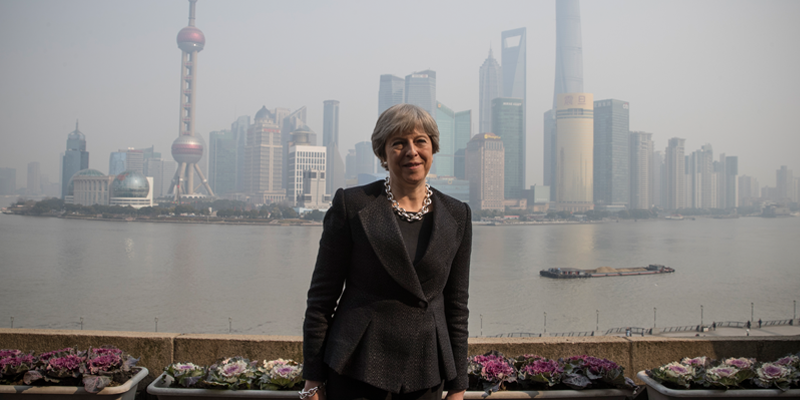The Prime Minister has returned from China to face demands that she make up her mind about Brexit. She is being told that she cannot wait any longer before making a choice about exactly what sort of relationship Britain should have with the European Union after we leave. But her party is deeply divided over what choice she should make and her studied ambiguity has been her way of trying to stop it from falling apart. Now, however, time is running out. So which choice should she make and is she capable of making it?
Theresa May’s deliberate lack of clarity goes right back to the beginning of her premiership in July 2016. She got the job only because the referendum decision to leave the EU caused her strongly pro-Remain predecessor, David Cameron, to resign. Her immediate task was to reassure those who had voted to leave that, although she had been a lukewarm Remainer, she would respect the result. Her way of doing so was to say, simply, ‘Brexit means Brexit’.
Exactly what that meant was anybody’s guess and that was how she wanted things to be while her new government got its head around the implications of what to many had been an unexpected decision by the British people.
It was clear from the start that there were two strikingly different ways of leaving the EU with a range of subtler variations in between. There was what came to be called ‘hard Brexit’ which, in its most extreme form, involved walking out of the EU without any deal on what a future relationship between Britain and its old partners might be. ‘Hard Brexit’, it was argued, would be the best way to guarantee the main goals of the Brexiteers: to release Britain from the decision-making grip of the EU, restore law-making wholly to the British Parliament, take back control of immigration and keep our money.
At the other end, ‘soft Brexiteers’ argued that our ties with the EU, built up in many fields over our forty years of membership, were far too valuable to jeopardise - especially with regard to the economy and trade. It is vital, they have argued, that we should seek to replicate as many of those ties as possible, albeit from outside the EU. Clearly such a ‘soft Brexit’ would have to be negotiated with our partners.
The Conservative Party (like the Labour Party and indeed Britain as a whole) was and remains deeply divided on the issue but Mrs May thought she could see a political way through. She would call an election, win a big majority and so give herself the strength to see off whichever group she was bound to outrage once she had made up her mind which option to choose. But, as we know, things did not work out like that. Instead she lost the majority she had had and was left vulnerable to both groups.
Meanwhile she had started the clock ticking. By invoking Article 50 of the Lisbon Treaty (the means by which an EU member state formally announces its intention to leave) in March last year she created a deadline: Britain would leave the EU on March 29th 2019. The choice could no longer be put off indefinitely. Our EU partners had made clear that until she invoked Article 50 they were not prepared to negotiate at all. They then said they were not prepared to address the main issue of our long-term relationship post-Brexit until various preliminaries had been agreed.
That was achieved up to a point in the deal struck last December: it was provisionally agreed what Britain’s ‘divorce bill’ (its outstanding financial obligations) would be; what the rights of EU citizens currently living in the UK and of British citizens living in EU countries would be; and how to avoid a hard border between the Irish Republic and Northern Ireland after Brexit (though this amounted to little more than a statement of aspiration).
It was also recognised that a final deal on Brexit could not be negotiated by March 2019 so it was agreed that there should be a ‘transitional period’ of about two years after that date for that final deal to be struck. During that period Britain would be formally outside the EU but by and large carrying on as though we were still in it. This would avoid a so-called ‘cliff edge’ over which business, in particular, might otherwise fall – no longer abiding by the old rules but not yet knowing what the new ones would be.
That is where we are now. In fact Mrs May muddies the waters by referring to the transition period as the ‘implementation’ period, even though there is nothing yet to implement. And there is a continuing row over what it should entail. The EU insists we must abide by all the current rules and any new ones created during the period without any longer having any say over them. Hard Brexiteers complain that this would turn Britain into a ‘vassal state’ during the transition and this week Mrs May (perhaps to appease them) has said she is going to fight to prevent any new EU migrants coming during the transition period from the same rights as those already here.
But the big issue remains what sort of final relationship Britain should be seeking. The complaint not just from her party and the opposition but also from our EU partners is that the Prime Minister continues to refuse to say. At Davos last month, the German Chancellor, Angela Merkel, is reported to have had journalists in stitches as she mocked the Prime Minister for (supposedly) bypassing the question ‘What does Britain want?’ by saying ‘Make me an offer’. A widely anticipated speech in which the Prime Minister was expected to outline her long-term aims has been put on hold or even abandoned altogether.
The government has made a few commitments beyond simply saying ‘Brexit means Brexit’. It has said Britain will leave the single market, in which countries trade without tariffs, and both accept EU-decided regulation and allow free movement of people. That was inevitable because to remain would prevent Britain from retaking total control of immigration and leave it subject to rulings by the European Court of Justice. And we will also leave the Customs Union (through which the EU negotiates trade arrangements with other countries as a bloc) because it wants the freedom for ‘Global Britain’ to do so itself.
But that hasn’t stopped ‘soft Brexiteers’ in the government from advocating policies which their opponents regard as contradicting these positions. In particular, the Chancellor, Philip Hammond, said in Davos, that he hoped the relationship with the EU could change only ‘very modestly’ after Brexit. There has also been talk of maintaining ‘regulatory alignment’ with the single market in order that trade should not be disrupted. And it has been reported this week that officials are floating some sort of continuing customs union, not least in order to prevent a hard Irish border. Anything less, they claim, would be hugely damaging to the economy, as a government-commissioned assessment of the economic consequences of Brexit leaked this week appears to have shown.
All this has incensed the other side. Jacob Rees-Mogg, the recently-elected chairman of the European Research Group of backbench Tory hard Brexiteers, said it was ‘very concerning’ that Britain was considering remaining in the customs union in the transition period, never mind afterwards; and he has coined the acronym ‘BINO’ – Brexit in name only – as the destination he fears cabinet ministers like Mr Hammond may be leading the government.
What they want is for Mrs May to make demands on the EU for a relationship that rules out a continued role for the European Court of Justice, ends the right of free movement of EU citizens to Britain and allows the UK to negotiate its own trade deals. If the EU won’t agree (and they have made abundantly clear that Britain cannot have its cake and eat it), then we should just walk away.
As she left China the Prime Minister continued to insist that this is a false choice and so one she does not have to make. But few are persuaded. One of her former Brexit ministers, Lord Bridges, said in the House of Lords on Tuesday: ‘All we hear day after day are conflicting, confusing voices. If this continues… how can the Prime Minister possibly negotiate clear and precise heads of terms for the future relationship with the EU?’ He said that all that was being constructed at the moment was ‘a gangplank into thin air’ and warned against ‘the very British habit of just muddling through’. Instead, he argued, we needed to make a choice: ‘What do we value more: parliamentary sovereignty and control or market access and trade?’
Which is the right choice to make? And is the Prime Minister capable of making the right one – or even any choice at all?
Let us know what you think.











